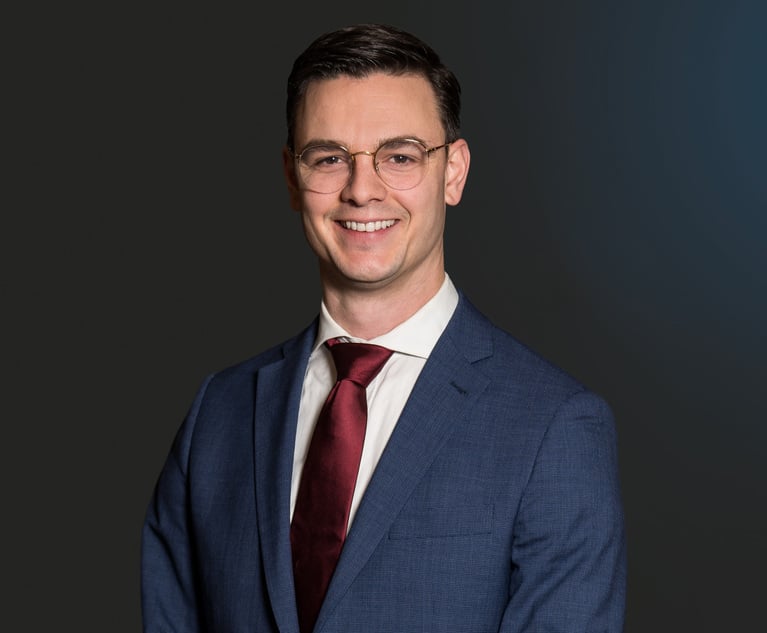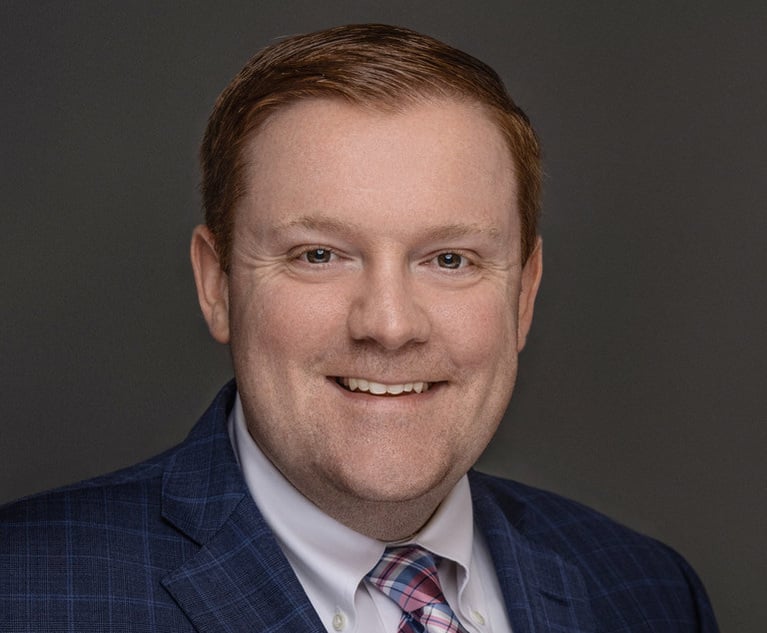Preparing the Next Generation of Lawyer Leaders
A new crop of leaders is gearing up to take the helm. Like their brethren before them, they have little in the way of formal experience or training for the roles they are about to inherit.
September 26, 2019 at 12:36 PM
8 minute read
 Marcie Borgal Shunk.
Marcie Borgal Shunk.
Smart Strategy
Four years ago, in a conference room full of aspiring leaders, an argument ensued. A vocal member of the group had taken umbrage with the committee's designation: the Young Leaders Group. While not especially offended at the intimation he was younger than his peers, he argued the association implied these lawyers, ranging in age from early-30s to late 40s, lacked a level of maturity. He went on to point out many in the room currently held and had held leadership roles for many years. The moniker, he said, undermined their authority and positions in the firm. Though seemingly trite to some—who doesn't love quibbling with lawyers over word choice—the sentiment hit the mark. Others responded and a new title took hold: the Next Generation Leaders.
In firms around the world, a similar discussion is underway. A new crop of leaders is gearing up to take the helm. Like their brethren before them, they have little in the way of formal experience or training for the roles they are about to inherit. More pressing, the demands on today's lawyer leaders are more complex and nuanced than ever before. A 2018 Legal Executive Institute report, "The State of Law Firm Leadership," by Patrick McKenna and David Parnell reports a stark 80% of firms believe challenges are either "more complex" or "almost overwhelming at times" compared to five years prior. Initial feedback and findings from "The Survey of Law Firm Professional Development," co-produced by LawVision Group and The Tilt Institute, reveals few firms have formal, systematic programs in place to equip lawyers with the broad range of leadership and business skills required to manage and lead multi-hundred-million or multibillion-dollar organizations.
Taken in combination, the outcome of feeling overwhelmed is not surprising. How can an individual unprepared, untrained and poorly informed in sophisticated business operations be expected to feel mastery in a new, unfamiliar role—especially in the face of game-changing shifts such as the potential redefinition of ownership models by the California or Utah bar association (a move which would open up the market to a broader and, let's face it, more business-savvy competitor set)? What it will take to set these new leaders' minds at ease is twofold. First, law firms must arm themselves with sophisticated, well-trained business professionals to support and guide them through the evolution of the industry. Second, these same firms must create environments in which these professionals will succeed.
It is this latter opportunity, in many respects, that is the more challenging. Evidence abounds indicating law firms have yet to make this critical transformation—to embrace business professionals and all they have to offer. This is where the next generation of lawyer leaders comes in. With the proper preparation, these leaders can have the greatest and most profound impact on their firms. Who better to herald a new way of thinking and a new approach to doing business than these up-and-coming leaders—so many of whom, already, buck traditional ways of delivering legal services in favor of efficiency, the use of technology and a greater sense of balance.
For the next generation of leaders to truly flourish will demand a substantive investment on the part of firms, as well as a willingness of current leaders not only to make this investment but also to embrace (or at least not stymie) the resulting ideas and approaches that will inevitably result. Three core areas where incoming leaders are likely to have the greatest impact based on industry trends and changing dynamics are:
Cultivating Cultures That Thrive
Business experts across the globe, from Dan Ariely to Simon Sinek to Dan Pink, expound on the importance of work environment for the cultivation of talent and competitive edge. In a wealth of theories, from debunking myths about compensation being the core driver of employee performance to isolating the value of articulating a company's core mission to internal and external constituents, business leaders and academics demonstrate a company's culture has a power far beyond the feel-good notions of the past. Extensive studies indicate traditional concepts of what makes a good company culture (e.g., "easy, happy" places to work) are at odds with actual outcomes.
Law firms are no exception. To ensure long-term viability, top law firms will delve into core facets of their culture—and compensation systems—to establish opportunities for their unique, talented workforce to thrive. Though experts vary in their exact recommendations, the underlying messages are consistent and clear. For professionals whose roles require critical thinking and creative problem-solving, a sense of purpose and safe, supportive environment are essential—and, incidentally, monetary rewards above a certain threshold matter little.
Myriad indicators of law firm culture, unfortunately, illustrate many firms have considerable growth to do in this realm. Cultural assessments of law firm clients reveal a tendency for law firms to prize perfectionism, an attribute antithetical to personal growth. Larry Richards' work with attorneys shows a natural propensity toward skepticism that can manifest in constant criticism of others' ideas and create insecure work spaces. And let's not get started on the discrepancy between rewarding hours versus outcomes. Culture, by far, will be the greatest opportunity for the next generation of leaders to make their mark.
Tackling Talent Development and Scarcity
Connie Brenton, chief of staff and senior director of legal operations for NetApp, recently penned an article detailing the talent shortage being created through the growth of alternative legal service providers (ALSPs). In it, she enumerates the types of qualities ALSPs seek in their hires, a list that reads like a catalog of "top traits for tomorrow's lawyers." She includes such characteristics as "self-starters who can problem-solve on their own," "have very good people skills" and "are not focused on status." She goes on to argue the threat ALSPs are creating to the overall talent pool of lawyers could handicap law firms in the future.
Connie's point is spot on. The way in which law firms have traditionally hired, staffed and developed associates is antiquated. Further, the actual skill sets which will define future generations of successful lawyers are markedly different than when today's leaders took their first steps into the hallowed halls of their graduate institutions. Law schools are slowly responding to these shifts (thanks in no small part to the work of leaders such as Bill Henderson). A number of law firms, too, are beginning to do their part, investing in chief talent officers, new psychometric hiring tools and professional development. Overall, however, the industry still has a way to go to ensure their talent model will transform and evolve to keep up with demands of the future.
Leading Data-Driven Change
Leading change, as anyone who has attempted it (and John Kotter) knows, is as much an art form as a skill set. Tacking on the added element of incorporating data and analysis into related change initiatives creates a high-impact and high-demand ask of blossoming leaders. The legal industry is far from unique in its efforts to become more data-driven. It is, however, hamstrung by its own history more than other sectors. Law firms have had little motivation until recent years to accurately capture, maintain and integrate various internal systems to produce reliable measures of internal operations, financial performance, talent development or even client service and satisfaction. Many, thus, are just now engaging in exercises to be able to use the wealth of information at their fingertips for competitive advantage.
Then, of course, there is the added dilemma of what to do with the data once firms have it. From data integrity to the elusive ability to motivate attorneys to change behavior (any behavior), law firm leaders are decidedly at a disadvantage. Whether for the purposes of understanding the firm's actual profit margins, deepening insights into client relationships or exploring "blue water" for strategic advancement, next generation leaders taught the intricacies of how to leverage insight into action will have a decisive marketplace advantage.
While these three facets of preparing the next generation of leaders are vital, they are by no means a comprehensive list. There are other essentials and areas to explore, such as the threat (and opportunity) of artificial intelligence (AI) and, perhaps most importantly, the requisite exploration of self-awareness as a precursor to becoming a great leader in any realm. Alas, these are topics for another day.
Marcie Borgal Shunk is president and founder of The Tilt Institute, a firm dedicated to unveiling new perspectives on law firm growth through intelligence, innovation and intuition. She specializes in helping law firm leaders make better, data-driven business decisions. Shunk is also a member of the ALM Intelligence Fellows Program.
More information on the ALM Intelligence Fellows Program can be found here.
This content has been archived. It is available through our partners, LexisNexis® and Bloomberg Law.
To view this content, please continue to their sites.
Not a Lexis Subscriber?
Subscribe Now
Not a Bloomberg Law Subscriber?
Subscribe Now
NOT FOR REPRINT
© 2025 ALM Global, LLC, All Rights Reserved. Request academic re-use from www.copyright.com. All other uses, submit a request to [email protected]. For more information visit Asset & Logo Licensing.
You Might Like
View All
Visa Revocation and Removal: Can the New Administration Remove Foreign Nationals for Past Advocacy?
6 minute read
Saul Ewing Loses Two Partners to Fox Rothschild, Marking Four Fla. Partner Exits in Last 13 Months
3 minute read
Trending Stories
- 1ACC CLO Survey Waves Warning Flags for Boards
- 2States Accuse Trump of Thwarting Court's Funding Restoration Order
- 3Microsoft Becomes Latest Tech Company to Face Claims of Stealing Marketing Commissions From Influencers
- 4Coral Gables Attorney Busted for Stalking Lawyer
- 5Trump's DOJ Delays Releasing Jan. 6 FBI Agents List Under Consent Order
Who Got The Work
J. Brugh Lower of Gibbons has entered an appearance for industrial equipment supplier Devco Corporation in a pending trademark infringement lawsuit. The suit, accusing the defendant of selling knock-off Graco products, was filed Dec. 18 in New Jersey District Court by Rivkin Radler on behalf of Graco Inc. and Graco Minnesota. The case, assigned to U.S. District Judge Zahid N. Quraishi, is 3:24-cv-11294, Graco Inc. et al v. Devco Corporation.
Who Got The Work
Rebecca Maller-Stein and Kent A. Yalowitz of Arnold & Porter Kaye Scholer have entered their appearances for Hanaco Venture Capital and its executives, Lior Prosor and David Frankel, in a pending securities lawsuit. The action, filed on Dec. 24 in New York Southern District Court by Zell, Aron & Co. on behalf of Goldeneye Advisors, accuses the defendants of negligently and fraudulently managing the plaintiff's $1 million investment. The case, assigned to U.S. District Judge Vernon S. Broderick, is 1:24-cv-09918, Goldeneye Advisors, LLC v. Hanaco Venture Capital, Ltd. et al.
Who Got The Work
Attorneys from A&O Shearman has stepped in as defense counsel for Toronto-Dominion Bank and other defendants in a pending securities class action. The suit, filed Dec. 11 in New York Southern District Court by Bleichmar Fonti & Auld, accuses the defendants of concealing the bank's 'pervasive' deficiencies in regards to its compliance with the Bank Secrecy Act and the quality of its anti-money laundering controls. The case, assigned to U.S. District Judge Arun Subramanian, is 1:24-cv-09445, Gonzalez v. The Toronto-Dominion Bank et al.
Who Got The Work
Crown Castle International, a Pennsylvania company providing shared communications infrastructure, has turned to Luke D. Wolf of Gordon Rees Scully Mansukhani to fend off a pending breach-of-contract lawsuit. The court action, filed Nov. 25 in Michigan Eastern District Court by Hooper Hathaway PC on behalf of The Town Residences LLC, accuses Crown Castle of failing to transfer approximately $30,000 in utility payments from T-Mobile in breach of a roof-top lease and assignment agreement. The case, assigned to U.S. District Judge Susan K. Declercq, is 2:24-cv-13131, The Town Residences LLC v. T-Mobile US, Inc. et al.
Who Got The Work
Wilfred P. Coronato and Daniel M. Schwartz of McCarter & English have stepped in as defense counsel to Electrolux Home Products Inc. in a pending product liability lawsuit. The court action, filed Nov. 26 in New York Eastern District Court by Poulos Lopiccolo PC and Nagel Rice LLP on behalf of David Stern, alleges that the defendant's refrigerators’ drawers and shelving repeatedly break and fall apart within months after purchase. The case, assigned to U.S. District Judge Joan M. Azrack, is 2:24-cv-08204, Stern v. Electrolux Home Products, Inc.
Featured Firms
Law Offices of Gary Martin Hays & Associates, P.C.
(470) 294-1674
Law Offices of Mark E. Salomone
(857) 444-6468
Smith & Hassler
(713) 739-1250






